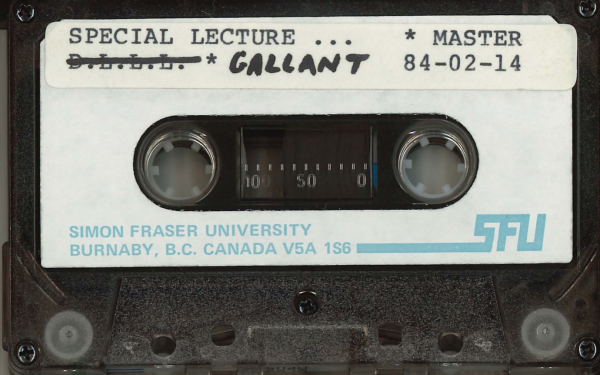A Modern-Day Epic
Canadian Writer Launches New Maximalist Novel “The Traymore Rooms”
What does it take to complete a novel of nearly 700 pages? Stephen King, J.R.R. Tolkien and J.K. Rowling know. And now, Montreal-based author Norm Sibum knows too.
After dedicating over three decades of his life to writing poetry, Sibum has made the switch to prose with his debut novel The Traymore Rooms.
Already receiving attention from literary web magazine The Millions, making their list of most-anticipated books of 2013 in July, the novel is set to make a heavy impact, and not just because of its formidable size.
Based in downtown Montreal and set in the era of the George W. Bush administration, the novel centres around Randall Q. Calhoun, a Vietnam War draft dodger and a “closet poet, steeped in Roman mythology,” who feels his life has hit a dead end.
He moves into the Traymore Rooms, a timeworn walk-up apartment, where he is accepted into the community of colourful tenants who occupy the other apartments.
The story unfolds through their interactions, handwritten notes slipped under doors and philosophical conversations in their local bar.
Things take a turn when new tenants move in but fail to blend into the small, intimate world of the other occupants.
The story also briefly takes Calhoun to America, the place he once called home, as well as Rome. Despite the global locations, it remains an intimate work, where important plot points are based around the characters simply talking amongst themselves.
“I didn’t want to write a point-by-point plotline, [or] an experimental novel,” Sibum says. “I wanted to keep it all open-ended, but maintain some sort of impetus, a reason to turn the page.”
By setting the novel in the city where he lives, Sibum brings an intimate realism, leaving the reader wondering what’s fact and fiction in the story.
“Everything and nothing,” he intones. “The characters are all based on real people that I know, but it’s fictionalized. I take liberties to build these characters. Otherwise, nothing in my life parallels that much.”
Picking Up the Craft
Sibum was born in Germany, and his father was an American army man, which led to a lot of time spent in the United States in his youth. Sibum then moved to Canada in 1968, settling in Vancouver.
It wasn’t until 1994 that he relocated across the country to Montreal, following a woman who he was in love with, and he’s been here ever since.
His love of the written word, however, began very early on in life.
“I’ve been writing ever since I was a kid,” he says, adding that he fondly remembers writing stories while living in Germany, fictionalized accounts of World Series games that he would show to his father, who praised him for his work. “That felt good, getting that commendation. I think that’s what really started it.”
Sibum has a love for literature, everything from Proust to Steinbeck and the Russian classics, but the writer has spent his career up until now penning poetry.
Writing a novel was not something he thought he would ever undertake.
“I wasn’t looking to make the transition. I’m still not sure I understand what happened,” he says.
“There was something I was trying to write in poetry and the poetry just wasn’t working. So I tried to write it out in prose. At first it was bewildering as hell, it really was.”
That was back in 2006, when he initially began the novel. It was a far from smooth shift into the new territory, with many false starts and an overall lack of confidence holding him back.
He says that in the beginning, those were not the only troubling aspects of the project.
“I was frightened of it,” Sibum confesses. “I knew it was going to take over my life.”
“When you get into writing something this long, you get into an intensity, the writing tends to take over—it’s like you’re not thinking anymore, it’s thinking.”
—Norm Sibum, author of The Traymore Rooms
Go Big or Go Home
For the next seven years, work on the novel proceeded to do just that.
“When you get into writing something this long, you get into an intensity, the writing tends to take over—it’s like you’re not thinking anymore, it’s thinking,” Sibum said.
He overcame his initial anxiety about the world of prose by writing an original draft that was twice the size of the final project, clocking in at around 1,400 pages. Cutting it in half was an editing endeavour he handled personally.
“I’d take it out every three or four months and try to revise it with fresh eyes,” he said.
Far from trying to rail against modern minimalism, Sibum insists that overwriting is just part of his process.
“I don’t think I was trying to make a statement, that’s just the way I work. I’ll write maybe a 20-page poem, then boil it down to six, then expand it again, then boil it down,” he says. “I’ll go through that process 50 times.”
Sibum is unfazed by the praises of those who favour his work for its maximalist nature, saying it was never his original intention to write such a lengthy novel.
“I just figured the book would be as long as it needed to be, until I felt satisfied that everything I wanted to say had been said,” Sibum explained.
The book does seem to have plenty to say, and it’s already being heard, earning a fairly warm reception from early reviewers who praise it for its creative prose and subtlety.
Regardless of whether his book’s a hit or not, Sibum says he likely won’t be writing another one. He’s already working on his next project, an epic poem—a style of poetry categorized for its extensive length.
“I’m primarily a poet who happens to have written a novel,” he said.
“I don’t get up in the morning thinking, ‘novel.’ I get up in the morning thinking, ‘poetry!’”
The Traymore Rooms Book Launch // Sept. 18 // Bar CFC (6388 St. Hubert St.) // 7 p.m. // Free admission




_600_375_90_s_c1.jpg)

